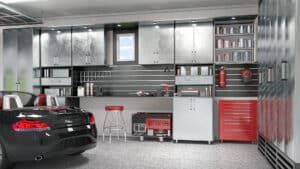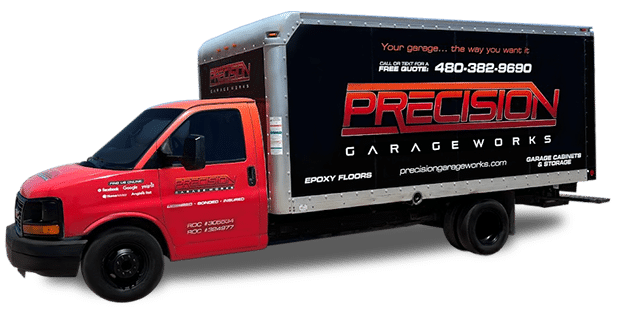Ever thought about how long your garage system will last? Knowing how long garage doors and openers last can prevent sudden failures and expensive fixes. This article explores how long garage systems in homes typically last. We look at key factors like how often you use it, the materials used, and upkeep.
By understanding the lifespan of each part, from doors to openers and storage, you’ll learn how to make your system last longer. Join us as we delve into the best ways to keep your garage in top shape for years to come.
Introduction to Garage Systems
Garage systems are key to a home’s function and look. They include doors, openers, shelving, and tech that fit into today’s life.
Homeowners want strong features in their garage systems. They want security and to make their home look better. Modern systems are now efficient and easy to use.
Automated doors and smart openers have changed garage systems. They make getting in and out easy and safe. Now, garages have smart shelving that uses every bit of space.
Technology has made garage systems smarter. Homeowners can control and watch their garages from anywhere. This adds security and convenience.
Knowing about garage systems helps us see their importance in a home. It’s important to think about their lifespan and upkeep. This ensures they work well for a long time.
Factors Affecting the Lifespan of Garage Systems
The lifespan of garage systems depends on several key factors. Local climate is a big one. Extreme temperatures can make materials expand and contract, causing wear and tear. High humidity can also lead to corrosion and rust, damaging the system’s parts.
How often you use your garage matters too. Garages used daily will wear out faster than those used less. This means you might need to maintain your garage system more often to keep it running well.
The quality of the initial installation is also crucial. A professional installation by certified experts can make a big difference. It ensures the system is set up right, reducing the chance of early failures. On the other hand, a bad installation can lead to many problems, making repairs more common and shortening the system’s life.
Preventive maintenance is key to making your garage system last longer. Regular checks and quick fixes can prevent big problems. Experts say a well-kept garage can last much longer than one that’s ignored.
Finally, the environment around your garage can affect it too. Pollution and salt, especially near the coast, can damage materials faster. Knowing this and taking steps to protect your garage can help it last longer. So, keeping your garage system in good shape is very important, especially in areas with harsh environments.
Types of Garage Systems and Their Lifespan
When looking at garage door types, it’s key to consider their materials and how they work. Each type has its own strengths and weaknesses that affect how long it lasts. Overhead doors, sectional doors, and automated systems each have their own benefits and lifespans.
Steel garage doors are known for being strong and needing little upkeep. They can last 20 to 25 years. Aluminum doors are lighter and last about 15-20 years. Wooden doors offer a classic look but need more care and last 15 to 20 years.
Fiberglass doors are great because they don’t dent or warp easily. They can last up to 20 years but may get brittle in extreme weather. Each garage door type has its own pros and cons to think about.
Automated garage systems add convenience and security but can be complex. They usually last 10 to 15 years. With regular care, like oiling parts and checks, they can work well for a long time.
Studies and data from makers help us understand how these systems perform. This knowledge helps homeowners choose based on durability and material quality. Knowing about automated garage system life expectancy and what affects it helps make smart choices.
Common Problems with Garage Systems
Knowing about common garage issues helps homeowners fix problems quickly. Issues like spring failures, opener malfunctions, and track problems are common.
Spring failures are a big problem. Springs get worn out and can snap, making the door unusable. Checking for rust or weakness can prevent this.
Opener malfunctions are also common. These can be due to electrical issues, faulty sensors, or motor problems. Keeping sensors clean and checking wiring helps.
Track alignment issues can also cause problems. Tracks can bend or get misaligned. Regular checks for alignment and debris help prevent damage.
These issues are among the most common repair needs. Experts stress the importance of regular maintenance. Simple checks and services can help avoid costly repairs.
In short, common garage problems like spring failures, opener malfunctions, and track issues need regular maintenance. Identifying problems early helps keep garage systems working well.
Cost Implications of Different Garage Systems
When looking at garage systems, knowing the costs is key. The price for setup, upkeep, and fixes changes a lot based on the system type. Homeowners need to think about these costs to pick a system that’s both good and affordable.
- Initial Installation Costs: The cost to start up garage systems varies a lot. Simple manual systems might cost a few hundred dollars. But, advanced automated systems could cost thousands. It’s important to think about the tech level and custom options needed.
- Maintenance Costs: Keeping your system in good shape is important. Manual systems are usually cheaper to maintain because they’re simple. But, automated systems, with their many parts and software, might need more upkeep.
- Repair Costs: Don’t forget about repair costs. Manual systems might just need occasional fixes. But, automated systems could need expensive electronic repairs or part swaps. Choosing a quality system upfront can save money later.
When picking a system, think about both short-term and long-term costs. A smart garage system investment balances initial cost with long-term savings. For example, a more expensive automated system might be worth it in the long run because it lasts longer and has more features.
Looking at real prices and getting advice from experts can help homeowners make the best choice. By looking at both the upfront cost and long-term benefits, you can make a smart investment in your garage system.
Upgrading Your Garage Systems
Technology keeps getting better, making garage system updates a must for homeowners. Smart technology is a big step forward. It lets you control your garage door with your phone, so you can open it from anywhere.
Today’s garage systems also have better security. They send alerts, lock automatically, and have cameras. These features keep your stuff safe and make you feel secure at home. Adding these features can make your garage last longer and work better.
Soon, garage systems will get even smarter. They’ll use artificial intelligence to know when they need fixing and work better. As these techs become common, updating your garage will be key to staying current.
Renovating your garage can save you money and make your home safer. By using the latest tech, your garage will stay in top shape for years.
Conclusion
Knowing how long garage systems last is key for homeowners. There are many ways to make them last longer. Regular care, timely updates, and smart choices about repairs or new systems are important.
The article talked about the main types of garage systems and how long they last. Things like weather, how often you use it, and keeping it up affect their lifespan. By making smart choices, you can make your garage last longer and save money.
Choosing the right garage system is about weighing short-term costs against long-term gains. Whether you’re upgrading or keeping your system new, knowing what to do helps. This way, you can keep your garage running well for years, saving money and increasing your property’s value.





